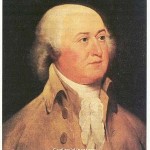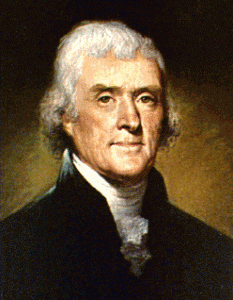Oddly enough, the two men were political rivals. Each wanted a different concept of how American government should function. Jefferson favored a decentralized federalism while Adams lobbied for stronger central power. Both of their ideas were brilliantly incorporated into the US Constitution. In one of history’s most remarkable coincidences, both men died on the same day: July 4, 1826, exactly 50 years to the day from the signing of the Declaration of Independence.
Thomas Jefferson
- Modern Unitarian-Universalists often claim both men, along with Adams’ son, sixth US President John Quincy Adams, as early adherents to their faith. Certainly the Adamses were committed to the Unitarian faith. Both graduated from Harvard College, which in the late 18th century had become a bastion of Unitarianism in Massachusetts. Their claim on Jefferson is questionable unless you consider his deist beliefs as akin to Unitarianism.
In any case, the Unitarianism of that time was far different from what is practiced today under that name. In that generation Unitarianism was sort of a non-trinitarian form of Christianity similar to ancient Arianism. Most Unitarians believed the Bible was divinely inspired but denied the full deity of Jesus Christ. They regarded him as the “Son of God” but not “God the Son”, somewhat like Jehovah’s Witnesses teach today.
Of course, we would regard that form of Chrisianity as heretical. In my next post we will see how modern Unitarian-Universalism has deviated totally from its Chrisitian and biblical roots, look at its present situation, and evaluate its future prospects.
See more about Unitarian-Universalism here.


